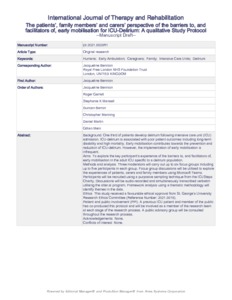Bennion, J; Garrett, R; Mansell, SK; Barron, D; Martin, D; Mein, G
(2022)
Barriers and facilitators of early mobilisation for intensive care unit delirium: perspectives from patients, family members and carers. A qualitative study protocol.
INTERNATIONAL JOURNAL OF THERAPY AND REHABILITATION, 29 (1).
ISSN 1741-1645
https://doi.org/10.12968/ijtr.2021.0020
SGUL Authors: Barron, Duncan Stewart
![[img]](https://openaccess.sgul.ac.uk/116514/1.hassmallThumbnailVersion/IJTR%20revised%20manuscript%20revised%20Aug%202021.pdf)  Preview |
|
PDF
Accepted Version
Available under License ["licenses_description_publisher" not defined].
Download (1MB)
| Preview
|
Abstract
Background/Aims
One-third of patients develop delirium following admission to an intensive care unit. Intensive care unit delirium is associated with poor patient outcomes, including long-term disability and high mortality. Early mobilisation contributes towards the prevention and reduction of intensive care unit delirium. However, the implementation of early mobilisation is infrequent. The aim of this protocol is to explore participants' experiences of the barriers to, and facilitators of, early mobilisation in the adult intensive care unit specific to people experiencing delirium.
Methods
Three moderators will carry out up to six focus groups including up to five participants in each group. Focus group discussions will be used to explore the experiences of patients, carers and family members using Microsoft Teams. Participants will be recruited from the charity ICUsteps using a purposive sampling technique.
Results
Discussions will be audio-recorded and simultaneously transcribed verbatim using the otter.ai programme. Member check approval will be sought to ensure accuracy of data. Framework analysis using a thematic methodology will identify themes in the data.
Conclusions
It is anticipated that the findings of this study will contribute towards further understanding the implementation of early mobilisation in order to improve measures for prevention and management of delirium in the adult intensive care unit.
| Item Type: |
Article
|
| Additional Information: |
This document is the Accepted Manuscript version of a Published Work that appeared in final form in International Journal of Therapy and Rehabilitation, copyright © MA Healthcare, after peer review and technical editing by the publisher. To access the final edited and published work see https://doi.org/10.12968/ijtr.2021.0020. |
| Keywords: |
Caregivers, Delirium, Early ambulation, Family, Intensive care units, Caregivers, Delirium, Early ambulation, Family, Intensive care units, 1103 Clinical Sciences |
| Journal or Publication Title: |
INTERNATIONAL JOURNAL OF THERAPY AND REHABILITATION |
| ISSN: |
1741-1645 |
| Publisher License: |
Publisher's own licence |
| Web of Science ID: |
WOS:000769529800004 |
| Dates: |
| Date |
Event |
| 2022-01-02 |
Published |
| 2022-02-03 |
Published Online |
| 2021-09-27 |
Accepted |
|
| URI: |
https://openaccess.sgul.ac.uk/id/eprint/116514 |
| Publisher's version: |
https://doi.org/10.12968/ijtr.2021.0020 |
Statistics
Item downloaded times since 22 May 2024.
Actions (login required)
 |
Edit Item |


